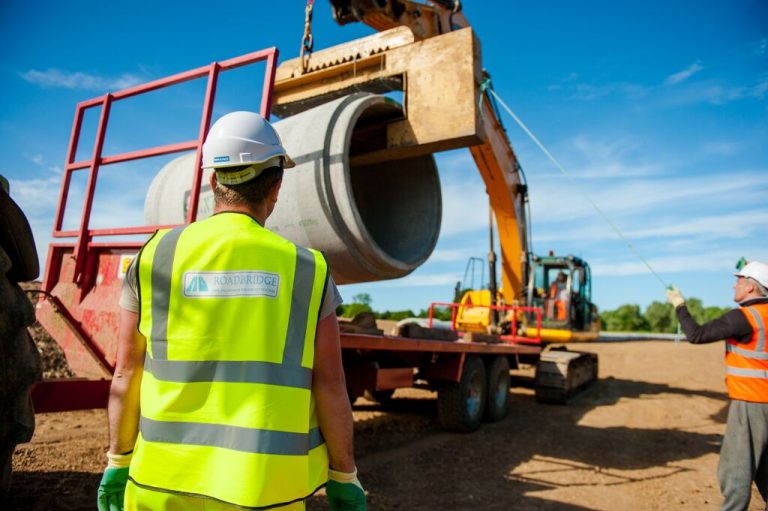Safety Is Not An Option Worker wellbeing goes hand in hand with business growth at Eurogold (The Following is a Promoted Article) “No Muddy Boots”, reads the sign at the door of Eurogold’s head office in Huyton near Liverpool. It is a simple, honest request and one that becomes increasingly revealing the better you know the company’s founder Damien Brickland & co-founder Andy Tomkins. Damien is a man of principle and hard work, a hands-on leader who has weathered the storm of recession with unwavering ambition. 12 years since it began, the company Eurogold now enjoys a reputation as one of the North West’s premier civil engineering contractors and has almost doubled turnover since 2013 to £26.5m. Its order book remains almost full and over the next five years the company is expected to enjoy annual growth of 9%. Eurogold’s rapid progression in the last 12 months is a mark of its approach during the recession. By operating to essentially cover overheads but, importantly, maintain its client base, staff and external workforce, Damien consolidated the company’s position to leave it ideally placed to grow during the upturn. Realising that the significant increase in contracts demanded further focus on all aspects of its operations, money was made available to invest in the business. This included £1.7m on new plant and vehicles to ensure the workforce had the best and safest tools and equipment at its disposal. The implementation of a full-time in-house Health and Safety Manager was another new addition. This was a necessity given the growing number of sites on which Eurogold was operating. In order to consistently deliver high standards for its clients and ensure the safety of its workforce, new measures were put in place to develop an already strong part of the business. Indeed, since the full-time introduction of Health and Safety Manager Michaela Connor, the bar has been set even higher. As a Worksafe Contractor and accredited to CHAS, Construction-line and the NHBC’s SafeMark scheme, Eurogold has nothing to prove when it comes to the safety of its workforce. But it’s the little things that make you stand out. That’s why the “no muddy boots” slogan has such significance. “A tidy site is a safe site,” comments Damien. “For us, the biggest thing in Health and Safety is that it begins with your perception of the business. It starts with a simple thing such as: are the vans clean? If you go in our cabins, are they tidy? That tends to tell you what’s happening on the site.” It is a strategy that comes from the top. “I go straight to the van, then I go to the site office, and finally the canteen,” adds Damien. “The state of these areas tell me everything I need to know about how well-run this site is. If the office is a mess, how well is that site being managed?” It is an approach that has brought dividend. Both Damien and Michaela enjoy a close working relationship with their site managers and the operatives on the ground. This has promoted openness amongst staff who are now more willing than ever to raise issues regarding safety, discuss their own attitudes and ideas, and highlight areas that could be improved. More than anything, safety has become an ingrained culture amongst the workforce meaning it is part of the job, not an addition to it. “Safety isn’t an option,” says Michaela. “It is the norm. What we can do, however, is take it up a level.” In fact, both Damien and Michaela are so confident in Eurogold’s health and safety procedures across its varied sites – currently 56 of them in total – they asked me to randomly pick any two for a spot visit, knowing I wouldn’t find any faults. As a groundworks and civil engineering business, Eurogold faces a number of different risks. Its varied work delivers solutions for such clients as house builders Redrow, Bellway, Wain, MCI Developments, Stewart Milne Homes, Partner Construction, Taylor Wimpey, Eccleston Homes, McCarthy & Stone, and Barratt Home; all blue chip companies that Damien is proud to be involved and associated with. Eurogold provides everything from bulk excavation, foundations and domestic drainage to hard and soft landscaping, and roads and sewer work. Risks are therefore similarly diverse from working at height to site transport, vibration, dust and manual handling. It is a challenge but one Michaela tackles head-on. In addition to daily visits by Contracts Managers and a documented weekly site inspection by the site foreman or supervisor, the Health & Safety Department will carry out regular qualitative and quantitative auditing which has been facilitated by the uninformed Health and Safety Management System implemented on every site. This has brought some key benefits such as creating a smooth transition between site teams and assisting in KPI benchmarking for compliance and standards. This is complemented by the CITB Construction Skills Card Scheme (CSCS/CPCS), which is the minimum requirement for anyone working on a Eurogold site. Further training is given such as NVQ’s, NPORS, WIAPS, SPIDER, First Aid, and NRASWA Street-Works, alongside additional on-going training based on task-specific activities include Manual Handling, Abrasive Wheel and Slinger Banksman to name a few. Furthermore, Eurogold’s onsite supervisory staff are qualified through the SMSTS or SSSTS training schemes. “I visit all our sites regularly and, alongside the Contracts Managers, we will identify any tweaks that we may need to make and deliver any training or refresher training where necessary. The training matrix is a live document so we assess on an ongoing basis,” remarks Michaela. “We care about our people,” adds Damien. “Once they’ve worked here for any length of time, they know it is the place to be. We give them the best training and high specification equipment, vehicles and facilities because if you get those things right, the standard of work and the services you provide for customers are right.” Incentivising best practice has also helped improve Health and Safety, and proven popular with the workforce.







